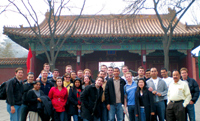Looking
East for a world of business insight
Intensive
experiential GIM course lets Kellogg students broaden their
global perspectives, learning firsthand the challenges of
doing business in Asia
By
Adrienne Murrill
Ed.
note: This spring, more than 500 Kellogg School students participated
in the Global
Initiatives in Management course, a popular academic
offering that combines 10 weeks of classroom training with
two weeks of field research in one of several countries. GIM,
which began at Kellogg in 1989, allows students to meet with
senior business and government leaders while pursuing research.
For centuries,
Asia has captivated the Western imagination as an exotic place
rich in culture, tradition and trade. Today's business leaders
remain as compelled as ever by Asia's economic prospects for
good reason.
"If
the corporate world ignores China and India, we are ignoring
one-third of the world's population," says Bala
Balachandran, the J.L. Kellogg Distinguished Professor
of Accounting Information and Management. A faculty adviser
on the Kellogg School Global Initiatives in Management
(GIM) excursion that took a group of students to China and
South Korea in March, Balachandran helped the participants
gain an intimate, valuable perspective on management challenges
and opportunities there.
 |
|
| Thirty
students participated in GIM-China/Korea, and they visited
the Forbidden City while in Beijing. |
|
| |
|
This
year, Kellogg students and faculty advisers organized 10 separate
trips. "GIM China-Korea" is similar to the other
two-week research excursions, offering intense, behind-the-scenes
learning through interaction with top politicians and business
leaders while immersing students in the country's culture.
Students toured Beijing, Shanghai and Seoul, enjoying attractions
such as Tianamen Square, the Forbidden City, the Oriental
Pearl Tower and Gyeongbokgung Palace, as well as acrobat shows
and a Huangpu River cruise.
Other
highlights featured leadership insights from U.S. Ambassador
Clark T. Randt Jr. "Doing business in China is an
exciting prospect," Randt told Kellogg students visiting
him in Beijing. China presents many different aspects, he
said, including the country's double-digit growth: Each year,
the country needs 7 percent growth just to absorb the new
workers entering the market, and 8 percent to maintain its
development.
Randt
also discussed how the Chinese and U.S. economies are "joined
at the hip." Seventy percent of China's economy is export-driven,
and the U.S. buys more than a third of those goods. China
can present special challenges for those seeking entrance
from outside the country, he said. For instance, Americans
tend to focus on the deal points in business, but the Chinese,
while aware of those points, focus on the overall business
relationship.
| |
|
| |
|
| |
 |
| |
GIM
India 2007 |
| |
|
| |
 |
| |
GIM
Africa 2007 |
| |
|
Doing
business in China actually keeps Andrew Grant awake
at night. The McKinsey & Co. managing director shared
his perspective with Kellogg students during an energetic
presentation in Shanghai about the challenges shaping China's
commerce.
"It
took 20 years for China's economy to become the size of Italy's,"
Grant said, but now the Asian behemoth grows by the size of
an Italy every year.
While
this pattern is exciting for business, Grant said, entering
China's market comes with risks — including those associated
with the country's banking system and the political instability
associated with Taiwan. Still, China's economic importance
is undeniable, and Grant advised business leaders to observe
the country's dynamics up close if they wish to create "tailored-to-China"
solutions to the hurdles their businesses will encounter in
this massive market.
"Expect
to be positively surprised on volume and negatively surprised
on margin," Grant said, adding that innovation is key
to win in China, a market he said operates at a pace unlike
any other.
As
the trip moved to Seoul, students visited Samsung Group's
headquarters where they toured Samsung's new product showroom
and attended a presentation by S.I. Lee, senior vice president
of marketing. He outlined the company's history, including
the radical restructuring after the Asian financial crisis
a decade ago. At that time, he quipped, the belief was to
"change everything except your spouse and kids."
Lee
said that Samsung embraces change and revises its strategy
to remain innovative. Most important in that strategy are
Samsung's employees, including some 30,000 in R&D, he
said.
Later,
students attended a presentation about one of Samsung's recent
successes — Bordeaux, a flat-panel TV, learning about
its development, design and the strategy behind the product.
Said
Pablo Merheb '08: "One eye-opening aspect of the
trip was realizing that my vision of what 'emerging' China
would look like was completely wrong. Beijing, Shanghai and
their surrounding cities are not only developed but sophisticated.
... The sheer pace of modernization and change is staggering." |



